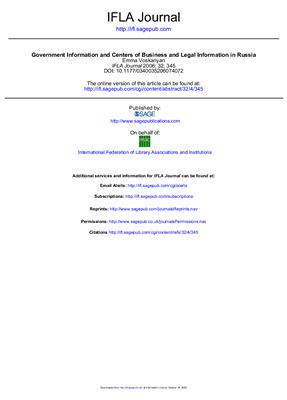Abstract
Russia is among the information-richest states with information
resources vast both in traditional and in new technologies. The Russian
state, acknowledging the provisions of inteational documents on
these problems, seeks all the possibilities to make access to the most
important information easier for everybody. Among the institutions
responsible for collecting, organizing and disseminating the information,
libraries play a signifi cant role. At the beginning of the 1990s Russian
legal reform specialists came to the conclusion that the major problem
is where to locate authoritative sources of offi cial information and legal
knowledge to ensure they could be open to general use. Russian experts
considered that such a source could be Russia’s public libraries. The
library system built during the years of Soviet power proved to be both
steady and fl exible and the library community was the most receptive
of all to change. The paper describes how, building on the solid base of
libraries, the govement reformers in 1993 created specialized models
of information access throughout the country, such as centers of business
information, centers of legal information and their modifi cations. The
system is functioning very effectively.
Russia is among the information-richest states with information
resources vast both in traditional and in new technologies. The Russian
state, acknowledging the provisions of inteational documents on
these problems, seeks all the possibilities to make access to the most
important information easier for everybody. Among the institutions
responsible for collecting, organizing and disseminating the information,
libraries play a signifi cant role. At the beginning of the 1990s Russian
legal reform specialists came to the conclusion that the major problem
is where to locate authoritative sources of offi cial information and legal
knowledge to ensure they could be open to general use. Russian experts
considered that such a source could be Russia’s public libraries. The
library system built during the years of Soviet power proved to be both
steady and fl exible and the library community was the most receptive
of all to change. The paper describes how, building on the solid base of
libraries, the govement reformers in 1993 created specialized models
of information access throughout the country, such as centers of business
information, centers of legal information and their modifi cations. The
system is functioning very effectively.

